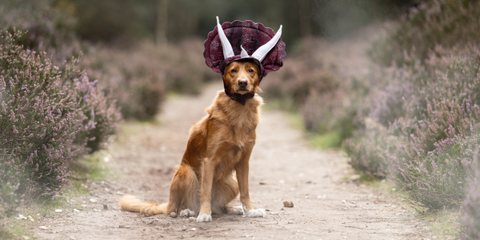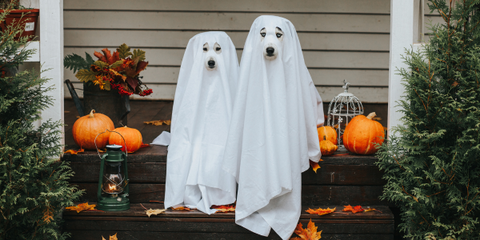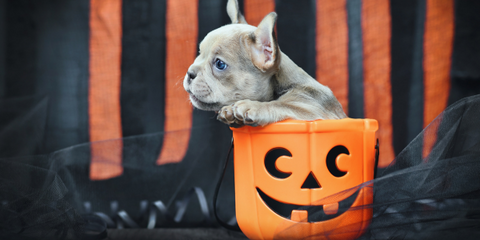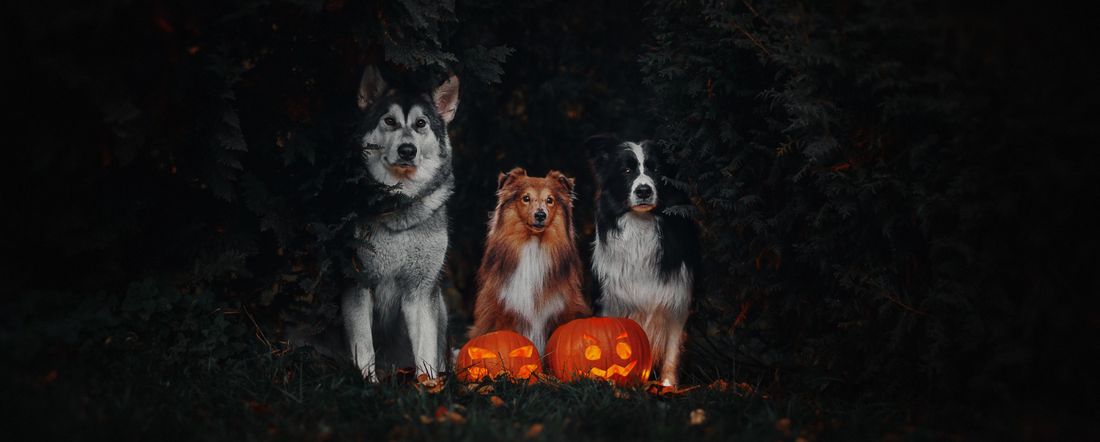Spooky season has arrived! Homes all across the country will likely find themselves surrounded by an array of sugary delights and snacks, ready for trick-or-treaters to come knocking at the door.
It appears that pet owners are taking extra precautions to safeguard their four-legged companions during the food-filled holiday season, with 2,400 Google searches for 'what can't dogs eat' in the past month!
With this in mind, Johanna Buitelaar-Warden, Founder of Lords and Labradors, has highlighted four foods that can be harmful to your dog and ways to keep your pets away from potentially dangerous snacks.

Can dogs eat pumpkin?
In short, yes - your dog can consume pumpkin flesh. Pumpkins are commonly found in many dog foods and may even be an ingredient in their regular meals. However, for safety's sake, avoid feeding your pup the prickly stalk – although it's not toxic, it might cause irritation in your dog's mouth and potential harm if ingested.
It's also crucial to remove the pumpkin skin before serving it to your dog, as it can pose a choking hazard and may lead to a serious risk of gut obstruction.

Can Dogs Eat Chocolate?
Be aware that chocolate is notoriously hazardous for dogs! This is because chocolate contains caffeine and theobromine, which can cause significant problems for your dog, even in small doses. Issues can range from mild stomach upsets to more serious complications like seizures and cardiac arrests.
To ensure your pet stays safe and healthy, it's essential to keep chocolate treats away from them, whether you have a young puppy or a fully grown adult dog.
Can Dogs Eat Sweets?
From sugar-free chewy fangs to jelly eyeballs, artificial sweeteners can be even more harmful to your dog's health than sugar. These types of sweet treats often contain an ingredient called Xylitol, which is highly toxic to dogs. Ingesting Xylitol can result in toxicity, which can set in as early as 30 minutes after consumption. Complications from Xylitol can jeopardize your dog's blood sugar levels and liver function.
Can Dogs Eat Popcorn or Chips?
Just like humans, dogs can tolerate a certain amount of salt in their daily diet. However, high levels of salt, as found in snacks like popcorn and chips, can lead to complications such as sodium or ion poisoning for your furry friend. This can result in various issues, from a high fever and vomiting to excessive thirst, seizures, and kidney damage.
Can Dogs Eat Raisins or Grapes?
While households that distribute fruit on Halloween may have your children's best interests in mind, healthier snacks like raisins, grapes, and sultanas can make your dog seriously ill if consumed. They can cause digestive problems in pups and, in some cases, kidney damage.
The toxic dose varies from dog to dog but can be very small in some cases, meaning that even a small portion can make them seriously unwell.

Are Puppies at a Higher Risk?
While it's important to keep dogs of all ages away from toxic foods like chocolate, high-salt snacks, and sugar-free alternatives, this is especially critical for puppies. Puppy food is formulated with a balance of proteins, enzymes, and other nutrients designed for their health and growth. Overindulging or nibbling on the wrong food can cause immediate and long-term complications for your fur baby.
Consuming rich or fatty foods as a puppy can increase the risk of diseases like pancreatitis, leading to a lifetime of gut sensitivity for your precious pup. Extra calories outside of a balanced diet may contribute to obesity, resulting in a shorter lifespan as an adult.
Tricks to Keep Your Dogs Away From Harmful Food
- Distance your dog from trick-or-treaters: It's a good idea to keep them in another part of the house where they'll be safe when trick-or-treaters come knocking.
- Provide them with their own treats to reduce temptation: Offering your pet some tasty, dog-friendly treats, is a great alternative to toxic human sweets and chocolate.
- Have a plan for storing sweets: It's important to have a plan for where the sweets will be stored, as leaving them on the floor, tables, or other easily accessible surfaces can pose a hazard to your dog.
- Ensure that household members and visitors are aware: Make sure to share the list of toxic foods with everyone in your household to ensure your pet's safety. Don't forget to inform potential guests who may want to give your pup a tasty treat!
If the worst-case scenario happens and you suspect your dog has ingested something harmful, treat it as an emergency and contact your local veterinarian immediately. Keep an eye on your pup for any unusual behavior, such as vomiting, lethargy, loss of coordination, excessive thirst, rapid heartbeat, or seizures.

